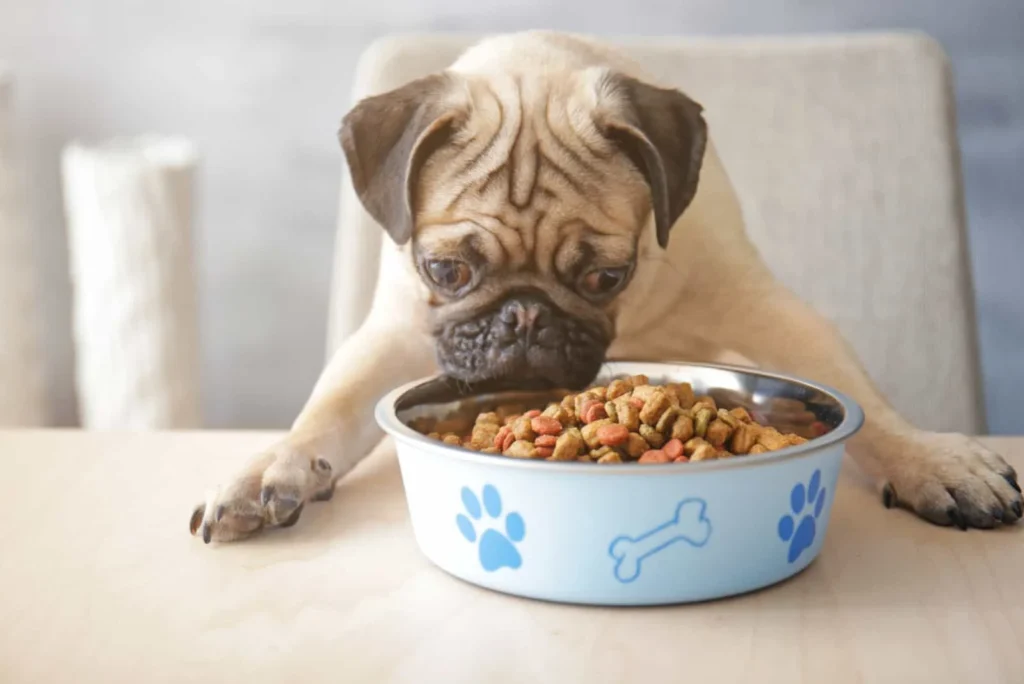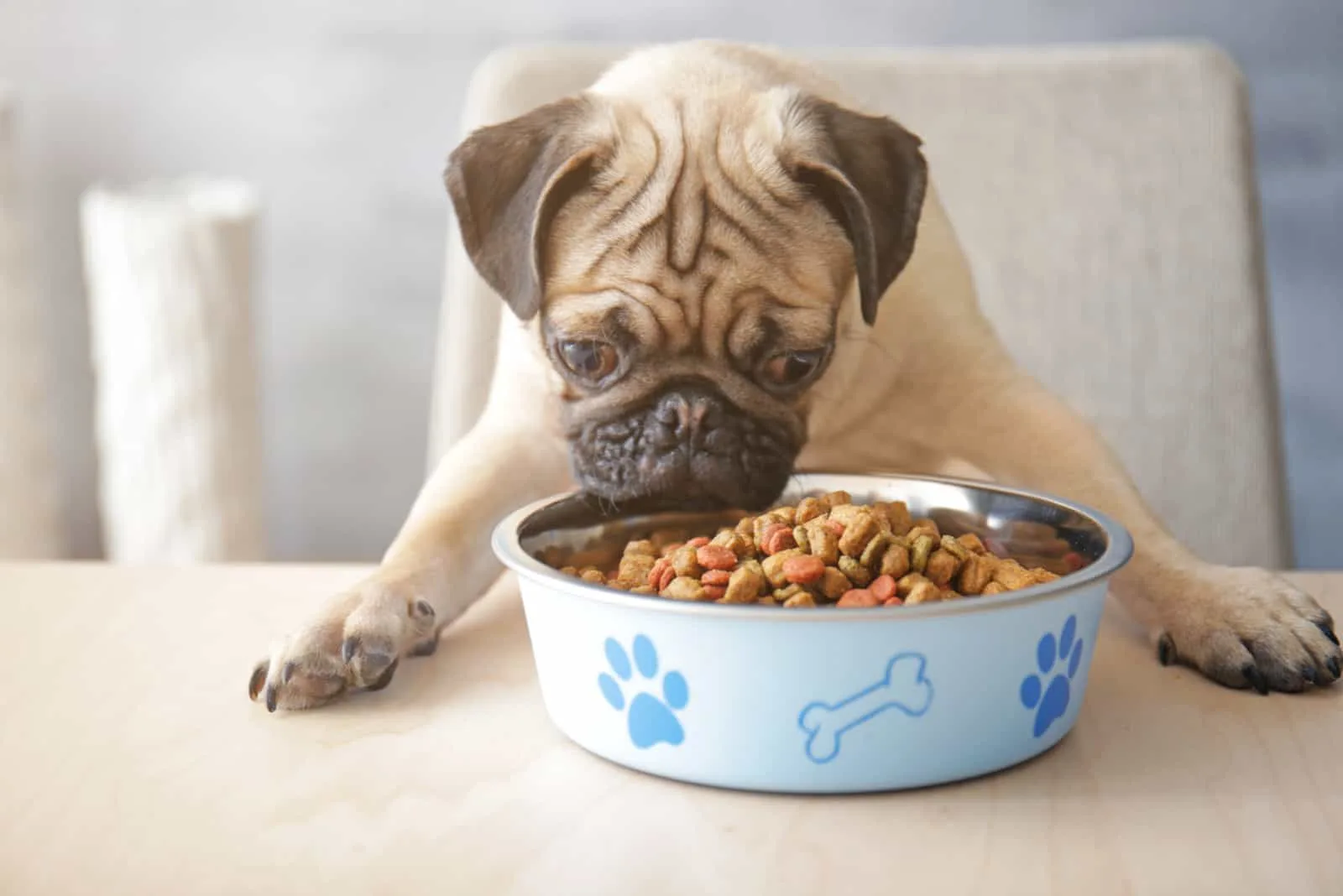Pugs are small, lovable dogs with big personalities and even bigger appetites. Their charming wrinkles, playful nature, and affectionate demeanor make them a favorite among pet owners. However, their unique physical and genetic traits mean they require specific dietary considerations to stay healthy. Choosing Best Dog Food for Pugs can be a daunting task, especially with so many options available in the market. This guide will walk you through everything you need to know to make an informed decision about your pug’s diet.

Understanding the Nutritional Needs of Pugs
Before exploring dog food recommendations, it’s essential to recognize the nutritional needs of pugs, given their unique physical traits and susceptibility to certain health issues.
1. Balanced Macronutrients
Pugs require a carefully balanced diet that includes appropriate levels of protein, fat, and carbohydrates. This balance is essential to support their energy levels throughout the day, helping them stay active and playful. Additionally, it is crucial for maintaining their muscle mass, which is important for their strength and mobility. Furthermore, a well-rounded intake of these nutrients promotes the overall health of pugs, ensuring they thrive both physically and mentally. Therefore, it is vital to provide them with a diet that meets their specific nutritional needs to keep them happy and healthy.
2. Essential Micronutrients
Pugs receive significant benefits from essential vitamins and minerals, including crucial nutrients such as Vitamin A, B-complex vitamins, calcium, and phosphorus. These important elements work together to support the overall health of pugs by promoting strong and healthy bones, maintaining good eyesight, and enhancing the functionality of the immune system. Ensuring that pugs have access to these vital nutrients is key to helping them thrive and enjoy a long, healthy life. By focusing on their dietary needs and incorporating these vitamins and minerals, pet owners can contribute to the well-being of their pugs in meaningful ways.
3. Weight Management
Pugs are particularly susceptible to becoming overweight and obese, largely as a result of their relatively small size combined with their enthusiastic love for tasty food. Because of this tendency, it is essential to choose their diet wisely. Incorporating foods that have carefully controlled calorie content alongside those that are high in fiber can play a crucial role in effectively managing their weight. This approach ensures that they can maintain a healthy weight without compromising their overall nutrition and well-being. By focusing on a balanced diet, owners can help their pugs enjoy their meals while also supporting a healthy lifestyle.
4. Allergy Considerations
A number of pugs can exhibit sensitivity to particular ingredients found in their food, such as grains, dairy products, or even certain types of proteins. Because of this, it might be beneficial to consider feeding sensitive pugs hypoallergenic formulas or grain-free options. These specialized diets can help alleviate potential allergic reactions and improve their overall well-being. By selecting a suitable formula that avoids these problematic ingredients, owners can ensure that their pugs receive the nutrition they need while minimizing any adverse responses that could arise from consuming foods they are sensitive to.
5. Joint and Bone Health
Because of their unique compact body structure and relatively short legs, pugs are at a higher risk of developing various joint problems as they age. To promote better joint health and support their mobility, it is beneficial to include foods enriched with glucosamine and chondroitin in their diet. These particular nutrients play a crucial role in maintaining healthy joints and can help alleviate some of the discomfort associated with joint issues in pugs.

Common Health Concerns in Pugs and How Diet Can Help
Pugs are prone to various health issues, but the right diet can help alleviate or prevent some of these conditions.
1. Obesity: Opt for high-fiber foods with controlled portions to keep your pug satisfied.
2. Brachycephalic Syndrome: Pugs have flat faces, which makes chewing and swallowing difficult. Smaller kibble or wet food can facilitate eating.
3. Skin Allergies: Foods rich in Omega fatty acids and free from common allergens can alleviate your pug’s itchy skin.
4. Joint Issues: Glucosamine-rich foods can promote joint health.
Top Dog Foods for Pugs in 2024
1. Royal Canin Pug Adult Dog Food
Royal Canin has a unique formula specifically crafted for pugs. It provides:
Custom kibble shape: Easier for brachycephalic breeds to grasp and chew..
Skin and coat health: High in Omega-3 and -6 fatty acids.
Weight control: Moderate fat intake to avoid obesity.
2. Blue Buffalo Life Protection Formula Small Breed
Blue Buffalo provides a nutrient-rich formula perfect for small breeds such as pugs.
High-quality protein: Deboned chicken is the main ingredient.
Whole grains and vegetables: Deliver key nutrients and fiber.
Life Source Bits: A mix of vitamins, minerals, and antioxidants.
3. Hill’s Science Diet Adult Small Paws
This formula is tailored for small dogs and supports their unique needs:
Easy-to-digest ingredients: Enhances gut health.
Antioxidants: Enhances immune health.
Precise calorie content: Aids in maintaining a healthy weight.
4. Wellness CORE RawRev Small Breed
This kibble features freeze-dried raw meat for pugs that prefer raw food.
High protein: Aids in muscle maintenance.
Grain-free: Ideal for pugs with grain allergies.
Probiotics and glucosamine: Improves digestion and joint health.
5. Merrick Lil’ Plates Small Breed Recipe
This option is designed specifically for small breeds with its small kibble size.
Real deboned meat: As the first ingredient.
Grain-free options: For pugs with sensitivities.
Rich in glucosamine and chondroitin: Promotes hip and joint health.
6. Purina Pro Plan Small Breed Shredded Blend
A nutritious and budget-friendly option for pug owners.
Dual-texture kibble: Crunchy kibble combined with tender shreds.
Live probiotics: Supports gut health.
Omega-rich formula: Promotes healthy skin and coat.
Homemade Diets for Pugs
Some pug owners choose to make homemade meals for their pets, allowing them to control ingredients. However, it’s crucial to consult a veterinarian or canine nutritionist to ensure the dog’s nutritional needs are met. Here’s a simple recipe for pugs:
Ingredients:
1 cup cooked lean ground turkey
½ cup cooked quinoa
1 cup steamed vegetables (carrots, green beans, spinach)
1 teaspoon fish oil (rich in Omega-3)
Instructions:
Cook the turkey thoroughly and drain excess fat.
Combine the cooked quinoa and steamed vegetables.
Add fish oil for skin and coat health.
Mix all ingredients and serve in portion-controlled amounts.
What to Avoid in Dog Food for Pugs
Not all dog foods are the same; some ingredients can harm pugs. Avoid these common offenders:
Artificial Additives: Preservatives, colors, and flavors can cause allergies or digestive issues.
By-products: Low-quality protein sources like meat by-products or meal.
Excessive fillers: Corn, soy, and wheat can be problematic for sensitive pugs.
High fat and calorie content: Can lead to obesity.
Conclusion
Choosing the best dog food for your pug can be straightforward. By addressing their nutritional needs, health concerns, and taste preferences, you can create a diet that keeps them happy and healthy. Whether you select a premium commercial brand or make homemade meals, the right care will help your pug thrive. Always consult your veterinarian to develop a tailored diet plan. With proper nutrition, your pug can enjoy a long, vibrant life full of energy and affection.
Read More: Best Dog Food for Cane Corso




Pingback: Best Limited Ingredient Dog Food: A Complete Guide 2024 - seesarkarijob.com
Pingback: Best Dog Food for Boxers: A Complete Guide 2024 - seesarkarijob.com